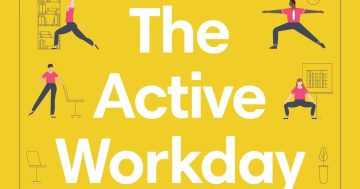Reina Gattuso* says the cycle of overwork is fuelled by a culture that teaches us to value making immense sacrifices to achieve big goals.
 When I was in high school, my group of nerdy and rather competitive friends liked to play the “how-little-did-I-sleep” game.
When I was in high school, my group of nerdy and rather competitive friends liked to play the “how-little-did-I-sleep” game.
It was as absurd as it sounds.
Every morning nodding off at our high school science class desks, we would humble-brag about how much homework we had done the night before, how many activities and hours of part-time work we had managed to squeeze in, and how little sleep we got.
We were hard workers, with cultural messages telling us that hard work was the only way to guarantee success.
We figured all that sacrificed sleep would surely pay off in future happiness — right?
Society pushes us to overwork
Not so fast.
In actuality, the pressure we felt to sacrifice wellbeing for success reflects an increasing reality of modern life.
We are working longer hours than ever before, even though our wages are stagnating.
This cycle of overwork is fuelled by a culture that teaches us to value making immense sacrifices to achieve big goals.
We’re often forced to choose between a promotion and quality time with family, or sacrificing sleep for extra productivity.
This pressure to push oneself can lead to burnout for anyone, and can be particularly burdensome and stigmatising for people living with mental illness.
For many people struggling to make ends meet, stepping back from difficult workplace conditions isn’t an option.
For others, stepping back for mental health reasons isn’t a choice — it’s survival.
If you’re in the position of rethinking your career trajectory for your mental health, it’s normal to have mixed feelings.
Yet many people who have made the choice to walk away from career goals that don’t support their wellbeing report greater health and fulfillment.
Psychological research on work and happiness backs this up: there’s no professional accolade that can replace social connection, good health, and a sense of purpose.
Overwork leads to worse mental health
We are working more than ever — and that’s bad news for our mental health.
As of 2018, one third of Americans worked 45 hours a week or more — that’s 7.8 per cent more hours than in 1979.
Meanwhile, we sleep an average of 6.5 hours a night, less than we did 80 years ago and less than the recommended seven to nine hours a night.
Wages, meanwhile, have largely stagnated — meaning that if you feel like you’re working harder just to tread water in the workplace, it’s definitely not all in your head.
These statistics don’t bode well for our mental health.
People who work longer hours are at higher risk for anxiety and depression.
They also get less sleep, which in turn leads to negative physical and mental health effects ranging from high blood pressure to a weakened immune system.
Beyond the time we spend working, job satisfaction is correlated to mental and physical health.
People who are less satisfied with their jobs experience worse health outcomes.
When to walk away
Everyone hits roadblocks and difficulties on the way to achieving a goal.
So how can you tell the difference between a simple setback on your path, and when your goals aren’t supporting your growth and happiness anymore?
Therapists recommend considering how your current situation is impacting you physically and mentally.
Do you still connect to a broader sense of purpose?
Does your work enable you to pursue other things that matter, like family, community, or activities that fulfil you?
Is your office environment toxic or abusive?
If you’re still inspired by your dream, but stuck in poor working conditions, you may be craving a more respectful and sustainable work environment in which to pursue your goals (and you’re entitled to that!).
If the goals you originally valued no longer resonate, it may be time for a bigger change.
These decisions aren’t entirely cerebral.
Psychological stress affects every aspect of our health, so people who have chosen to take a different career direction for the sake of their mental health recommend paying attention to your body.
Jamie Sogan, who writes about leaving her law job in favour of her mental health in Thrive Global, describes the daily physical toll of working a high-pressure job that was unfulfilling and incompatible with her mental health.
“If something in your life is making you sick every day, then don’t be afraid to stand up for your own health and wellbeing and make a change,” she writes.
Care is courageous
In a culture where our professions often become our identities, giving up a career goal or even an entire career path can be daunting, to say the least.
It’s also not something every worker, particularly workers living paycheque to paycheque, can do.
But if your job is making you miserable or your original goals aren’t compatible with your future thriving, re-evaluating your aims might be the right choice.
Everyone should be able to earn a living without having to sacrifice their health.
In a competitive environment, choosing care is an act of courage.
If the goals you once valued are no longer compatible with your individual and social thriving, walking away isn’t giving up — it’s growing.
* Reina Gattuso is a columnist at Feministing. She tweets at @reinagattuso.
This article first appeared at www.talkspace.com.











